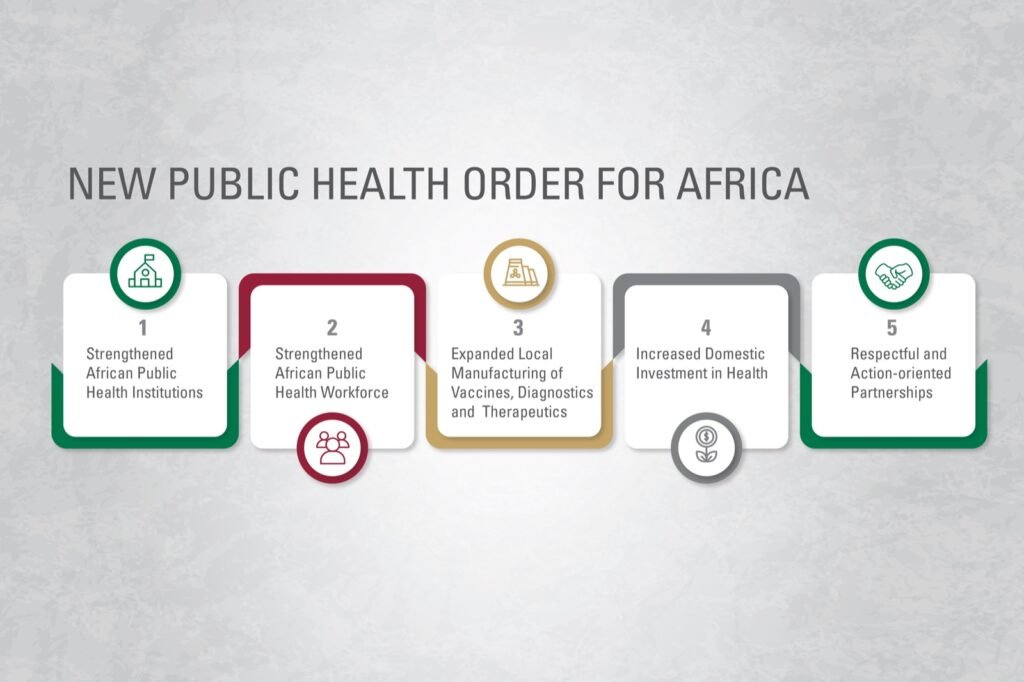The 12th Annual Conference of Speakers of National and Regional Parliaments, hosted by the Pan African Parliament (PAP) in Midrand, South Africa, brought together African parliamentarians to shape the future of the continent, including on devastating issues. It was a ground-breaking event that discussed important issues. Floods, climate change, MPOX, non-communicable diseases, food security, regional cooperation, peacebuilding.
On September 18, 2024, Africa CDC Director General Dr. Jean Kaseya took to the stage to share Africa CDC’s vision for a safer and healthier Africa, speaking on behalf of Southern Africa Regional Director Dr. Lulu Leake. . Regional cooperation center. He told speakers why the new public health order is important for the African continent and how the Africa CDC has so far effectively responded to infectious disease outbreaks such as Mpox that are ravaging the continent. I explained why.
The new public health order is a path to independence, he said. Existing global mechanisms, policies and interventions consistently fail to address Africa’s health security priorities, as recently highlighted by the COVID-19 pandemic, MPOX and Ebola. he told the gathering.
He explained that a fundamental paradigm shift towards a fair and just public health landscape is needed through a new public health order for the continent. He added that the continent needs to manage its health security through strong local leadership, innovation and investment in public health infrastructure and systems.
He said the new public health order aims to ensure that an adequate health system exists before the crisis and remains resilient during and after the crisis. The plan to achieve this order focuses on five enablers: community health, connectivity through digital health tools, capacity, collaboration, and climate.
The new public health order envisions strengthening national public health institutes and laboratories that will work with local universities to provide expertise in emergency surgery centers (EOCs) and genome sequencing capabilities. We aim to develop and expand local manufacturing for vaccines, diagnostics, therapeutics and medical supplies, all produced on the continent. Respectful, action-oriented partnerships are needed that ensure long-term engagement and alignment of priorities with member states, with African countries taking the lead.
He said the expansion of domestic health financing is in accordance with the 2001 Abuja Declaration, which states that African countries should allocate 15% of their budgets to health, and that the African Union convened a meeting of heads of state in February 2019. He stated that the ALM Declaration announced at the time should be respected. Addis Ababa Government, Regional and Global Leaders, African Leadership Conference – Investing in Health. ALM aims to put in place political and technical mechanisms that support and enable countries to steadily increase domestic investment in the health sector and hold each other accountable in collective commitments to do so. Masu. African leaders also agreed to establish the African Epidemic Fund in February 2022. The fund can also accelerate the implementation of the new public health order.
Regarding strengthening the public health workforce, Dr. Kaseya said the new public health order will result in the training of more field epidemiologists, the deployment of community health workers, and the training of a new generation of public health leaders. Ta. Other health professionals are also eligible, including the Kofi Annan Fellowship in Public Health Leadership, which was launched on May 25, 2020.
Dr Kaseya stressed that the new public health order is based on an analysis of Africa’s public health systems and institutions. He said that while 23 Member States have established National Public Health Institutes, not all of them are fully operational and functional, and 21 countries are in the process of establishing NPHIs. .
He said many member states still rely on indicator-based monitoring systems, with limited implementation of event-based or advanced processes. More than 160 disease outbreaks are reported each year, highlighting gaps in Member States’ ability to prepare for and respond to emergencies. For example, only 5% of laboratories in their country diagnose priority diseases and are equipped to meet international standards. Africa is highly dependent on imports. Only 1% of vaccines and 30-40% of treatments are manufactured on the African continent. Dr Kaseya told MPs that 106 new events were reported in 2024 and an average of 27 events are being monitored each week, of which three are new events.
As Mpox cases surge in Africa due to increased human-to-human transmission and lack of response capacity, key challenges include weak surveillance, limited testing capacity, infection prevention practices and public awareness. , lack of community involvement, vaccines and treatments, he said. .
Consultation and communication between Africa CDC, WHO, and all partners established one plan with one team, one relationship, one budget, and one monitoring and evaluation framework. “This is the first time a government agency has used a transcontinental coordination team, response plan, budget, and monitoring and evaluation framework in a large-scale health response,” he said.
Africa CDC is working with partners to identify and shortlist Mpox testing solutions, including point-of-care testing kits. The AU health agency has previously delivered sequencing equipment and reagents to Burundi and the Central African Republic, and an automated liquid handling system to speed up testing and sequencing at the INRB in the Democratic Republic of the Congo. Dr. Kaseya called on the Pan-African Parliament and all key stakeholders to support countries to strengthen Mpox surveillance, point-of-entry testing, awareness and vaccination campaigns.

